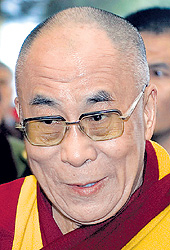 |
| Dalai Lama |
While the Central government hems and haws over Taslima Nasreen’s future in India, the country, strangely, does not have any system, policy or law governing the asylum issue. No legal benchmark exists at all for deciding who, among the thousands that come pouring in from neighbouring countries every year, should be granted political asylum or refugee status.
India is host to over 3.5 lakh registered refugees, mostly from Tibet and Sri Lanka. Then there are others from Afghanistan, Bangladesh, Myanmar, Iran, Palestine, Iraq and Sudan, who come knocking on the country’s door seeking refuge. “It is all ad hoc, decided on a case to case basis,’’ says a senior home ministry official. The authorities may use a section of the Foreigners’ Act or the Citizenship Act or immigration laws to decide on each case. A Draft Model Refugee Law was drawn up a few years ago but was never really taken up seriously, reveals Ragini Trakroo of Human Rights Law Network, and author of two books on the issue of refugees.
India’s most famous refugee is, of course, the Dalai Lama, who fled Tibet and came to the country in 1959 and was granted political asylum soon after. The 80,000 Tibetans who followed him into the country were also given refugee status. Nasreen, though, has so far been denied that status. She continues to stay in the country on a tourist visa that is renewed periodically.
Trakroo says that unlike Western countries, there is no policy or body in India to determine the refugee status of an individual. “There is just no concept of a refugee,’’ she says. India is not even a signatory to the 1951 Convention for Refugees, she adds.
The whole problem of refugees is complicated in India since it shares its borders with so many countries, and is generally at the receiving end of refugee flow from most of them. “However, that is all the more reason India must have a proper system in place,’’ says Trakroo.
There are approximately two lakh registered Tibetan refugees in the country, and about one lakh Sri Lankans. Most of them have been issued refugee cards by the government, granting them specific concessions and schemes. But when it comes to granting citizenship, the government has been even more cautious — only 250 Afghan Hindus and Sikhs have been awarded Indian citizenship so far.
Taslima Nasreen has been wanting Indian citizenship for long. But in this scenario, and given the way the government has been getting itself in a twist over her, she will be lucky even to get refugee status. Ever.
Bhavna Vij Aurora










